Corporate Social Responsibility and Impact →
→

- 23 Apr 2024
- In Practice
Getting to Net Zero: The Climate Standards and Ecosystem the World Needs Now
What can companies and regulators do as climate predictions grow grimmer? They should measure their impact, strengthen environmental institutions, and look to cities to lead, say Robert Kaplan, Shirley Lu, and Rosabeth Moss Kanter.

- 22 Apr 2024
- Research & Ideas
When Does Impact Investing Make the Biggest Impact?
More investors want to back businesses that contribute to social change, but are impact funds the only approach? Research by Shawn Cole, Leslie Jeng, Josh Lerner, Natalia Rigol, and Benjamin Roth challenges long-held assumptions about impact investing and reveals where such funds make the biggest difference.

- 18 Mar 2024
- Research & Ideas
When It Comes to Climate Regulation, Energy Companies Take a More Nuanced View
Many assume that major oil and gas companies adamantly oppose climate-friendly regulation, but that's not true. A study of 30 years of corporate advocacy by Jonas Meckling finds that energy companies have backed clean-energy efforts when it aligns with their business interests.
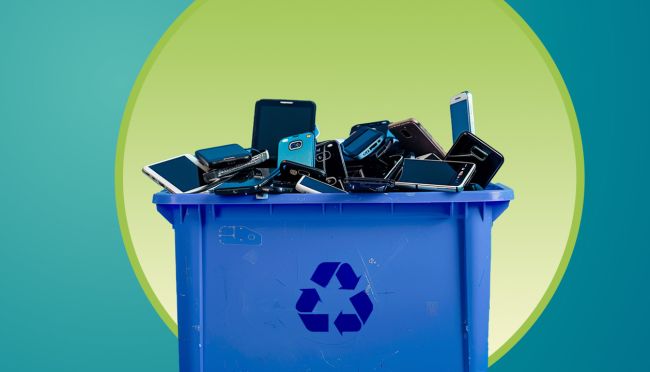
- 12 Mar 2024
- HBS Case
How Used Products Can Unlock New Markets: Lessons from Apple's Refurbished iPhones
The idea of reselling old smartphones might have seemed risky for a company known for high-end devices, but refurbished products have become a major profit stream for Apple and an environmental victory. George Serafeim examines Apple's circular model in a case study, and offers insights for other industries.

- 17 Jan 2024
- Research & Ideas
Are Companies Getting Away with 'Cheap Talk' on Climate Goals?
Many companies set emissions targets with great fanfare—and never meet them, says research by Shirley Lu and colleagues. But what if investors held businesses accountable for achieving their climate plans?

- 09 Jan 2024
- Research & Ideas
Could Clean Hydrogen Become Affordable at Scale by 2030?
The cost to produce hydrogen could approach the $1-per-kilogram target set by US regulators by 2030, helping this cleaner energy source compete with fossil fuels, says research by Gunther Glenk and colleagues. But planned global investments in hydrogen production would need to come to fruition to reach full potential.

- 02 Jan 2024
- Cold Call Podcast
Should Businesses Take a Stand on Societal Issues?
Should businesses take a stand for or against particular societal issues? And how should leaders determine when and how to engage on these sensitive matters? Harvard Business School Senior Lecturer Hubert Joly, who led the electronics retailer Best Buy for almost a decade, discusses examples of corporate leaders who had to determine whether and how to engage with humanitarian crises, geopolitical conflict, racial justice, climate change, and more in the case, “Deciding When to Engage on Societal Issues.”
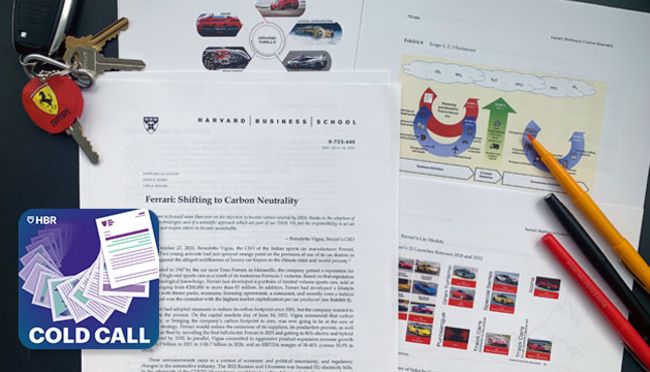
- 12 Dec 2023
- Cold Call Podcast
Can Sustainability Drive Innovation at Ferrari?
When Ferrari, the Italian luxury sports car manufacturer, committed to achieving carbon neutrality and to electrifying a large part of its car fleet, investors and employees applauded the new strategy. But among the company’s suppliers, the reaction was mixed. Many were nervous about how this shift would affect their bottom lines. Professor Raffaella Sadun and Ferrari CEO Benedetto Vigna discuss how Ferrari collaborated with suppliers to work toward achieving the company’s goal. They also explore how sustainability can be a catalyst for innovation in the case, “Ferrari: Shifting to Carbon Neutrality.” This episode was recorded live December 4, 2023 in front of a remote studio audience in the Live Online Classroom at Harvard Business School.
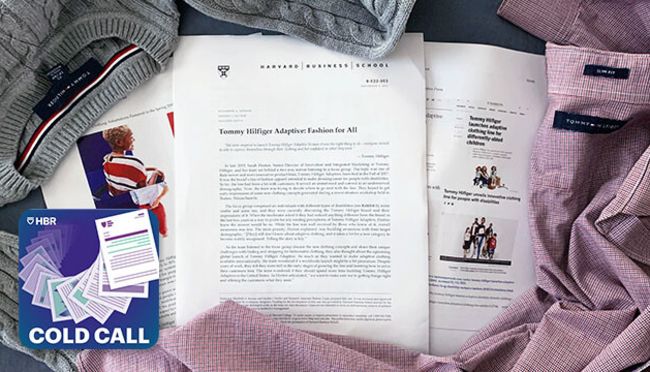
- 05 Dec 2023
- Cold Call Podcast
Tommy Hilfiger’s Adaptive Clothing Line: Making Fashion Inclusive
In 2017, Tommy Hilfiger launched its adaptive fashion line to provide fashion apparel that aims to make dressing easier. By 2020, it was still a relatively unknown line in the U.S. and the Tommy Hilfiger team was continuing to learn more about how to serve these new customers. Should the team make adaptive clothing available beyond the U.S., or is a global expansion premature? Assistant Professor Elizabeth Keenan discusses the opportunities and challenges that accompanied the introduction of a new product line that effectively serves an entirely new customer while simultaneously starting a movement to provide fashion for all in the case, “Tommy Hilfiger Adaptive: Fashion for All.”
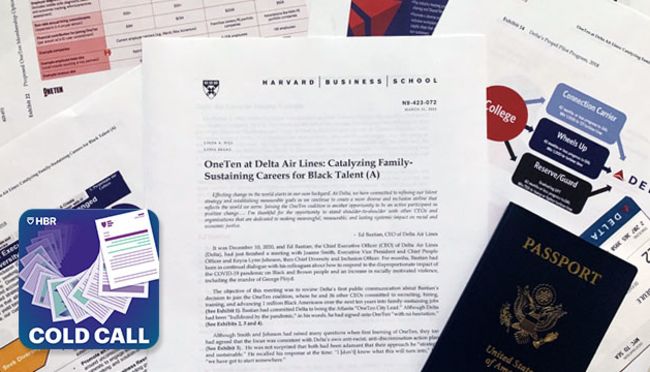
- 21 Nov 2023
- Cold Call Podcast
Cold Call: Building a More Equitable Culture at Delta Air Lines
In December 2020 Delta Air Lines CEO Ed Bastian and his leadership team were reviewing the decision to join the OneTen coalition, where he and 36 other CEOs committed to recruiting, hiring, training, and advancing one million Black Americans over the next ten years into family-sustaining jobs. But, how do you ensure everyone has equal access to opportunity within an organization? Professor Linda Hill discusses Delta’s decision and its progress in embedding a culture of diversity, equity, and inclusion in her case, “OneTen at Delta Air Lines: Catalyzing Family-Sustaining Careers for Black Talent.”

- 21 Nov 2023
- Op-Ed
The Beauty Industry: Products for a Healthy Glow or a Compact for Harm?
Many cosmetics and skincare companies present an image of social consciousness and transformative potential, while profiting from insecurity and excluding broad swaths of people. Geoffrey Jones examines the unsightly reality of the beauty industry.

- 16 Oct 2023
- HBS Case
Advancing Black Talent: From the Flight Ramp to 'Family-Sustaining' Careers at Delta
By emphasizing skills and expanding professional development opportunities, the airline is making strides toward recruiting and advancing Black employees. Case studies by Linda Hill offer an inside look at how Delta CEO Ed Bastian is creating a more equitable company and a stronger talent pipeline.

- 12 Sep 2023
- What Do You Think?
Who Gets the Loudest Voice in DEI Decisions?
Business leaders are wrestling with how to manage their organizations' commitment to diversity, equity, and inclusion. If you were a CEO, which constituency would you consider most: your employees, customers, or investors? asks James Heskett. Open for comment; 0 Comments.
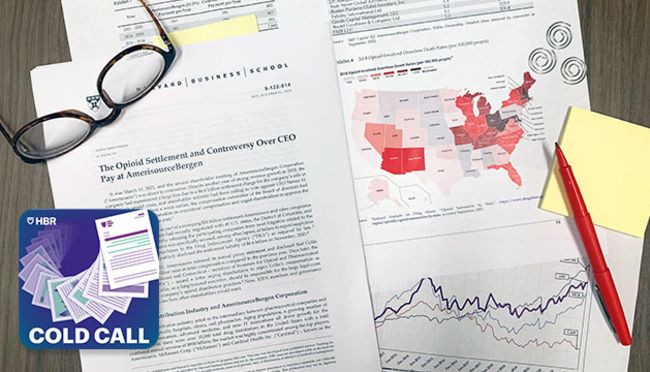
- 06 Jun 2023
- Cold Call Podcast
The Opioid Crisis, CEO Pay, and Shareholder Activism
In 2020, AmerisourceBergen Corporation, a Fortune 50 company in the drug distribution industry, agreed to settle thousands of lawsuits filed nationwide against the company for its opioid distribution practices, which critics alleged had contributed to the opioid crisis in the US. The $6.6 billion global settlement caused a net loss larger than the cumulative net income earned during the tenure of the company’s CEO, which began in 2011. In addition, AmerisourceBergen’s legal and financial troubles were accompanied by shareholder demands aimed at driving corporate governance changes in companies in the opioid supply chain. Determined to hold the company’s leadership accountable, the shareholders launched a campaign in early 2021 to reject the pay packages of executives. Should the board reduce the executives’ pay, as of means of improving accountability? Or does punishing the AmerisourceBergen executives for paying the settlement ignore the larger issue of a business’s responsibility to society? Harvard Business School professor Suraj Srinivasan discusses executive compensation and shareholder activism in the context of the US opioid crisis in his case, “The Opioid Settlement and Controversy Over CEO Pay at AmerisourceBergen.”

- 18 Apr 2023
- Research & Ideas
What Happens When Banks Ditch Coal: The Impact Is 'More Than Anyone Thought'
Bank divestment policies that target coal reduced carbon dioxide emissions, says research by Boris Vallée and Daniel Green. Could the finance industry do even more to confront climate change?

- 04 Apr 2023
- Book
Two Centuries of Business Leaders Who Took a Stand on Social Issues
Executives going back to George Cadbury and J. N. Tata have been trying to improve life for their workers and communities, according to the book Deeply Responsible Business: A Global History of Values-Driven Leadership by Geoffrey Jones. He highlights three practices that deeply responsible companies share.

- 23 Mar 2023
- Research & Ideas
As Climate Fears Mount, More Investors Turn to 'ESG' Funds Despite Few Rules
Regulations and ratings remain murky, but that's not deterring climate-conscious investors from paying more for funds with an ESG label. Research by Mark Egan and Malcolm Baker sizes up the premium these funds command. Is it time for more standards in impact investing?

- 16 Feb 2023
- HBS Case
ESG Activists Met the Moment at ExxonMobil, But Did They Succeed?
Engine No. 1, a small hedge fund on a mission to confront climate change, managed to do the impossible: Get dissident members on ExxonMobil's board. But lasting social impact has proved more elusive. Case studies by Mark Kramer, Shawn Cole, and Vikram Gandhi look at the complexities of shareholder activism.

- 31 Jan 2023
- Research & Ideas
It’s Not All About Pay: College Grads Want Jobs That ‘Change the World’
Many college graduates will accept lower salaries for roles that have the potential to give back to society, says research by Letian Zhang. Could trading pay for altruism help shrink the income gap?

Amazon in Seattle: The Role of Business in Causing and Solving a Housing Crisis
In 2020, Amazon partnered with a nonprofit called Mary’s Place and used some of its own resources to build a shelter for women and families experiencing homelessness on its campus in Seattle. Yet critics argued that Amazon’s apparent charity was misplaced and that the company was actually making the problem worse. Paul Healy and Debora Spar explore the role business plays in addressing unhoused communities in the case “Hitting Home: Amazon and Mary’s Place.”